- Home
- Peter F. Hamilton
The Mandel Files Page 4
The Mandel Files Read online
Page 4
Whistles and shouts floated down from the back of the chalet row, the estate kids’ twenty-four-hour football game in full swing. Up towards Edith Weston, bright, colourful sails of windsurfers whizzed about energetically. The county canoe team was out in force, enthusiastically working themselves into a collective heat stroke as their podgy coach screamed abuse at them through a bullhorn. Hireboats full of amateur fishermen and their expensive tackle drifted idly in the breeze.
Greg hadn’t quite nodded off when he heard the car approaching. Eleanor raised herself on to her elbows, and pushed her sunglasses up, frowning.
“Now that is unreal,” she murmured.
Greg agreed. The car was old, a nineteen-fifties vintage Silver Shadow, its classic, fabulously stylish lines inspiring instant envy. The kind of fanatical devotion invested in both its design and assembly were long-faded memories now, a lost heritage.
Astonishingly, it still used the original combustion engine with a recombiner cell grafted on, allowing it to burn petrol. Two pressure spheres stored its exhaust gas below the chassis, ready for converting back into liquid hydrocarbon when the cell was plugged into a power source. The system was ludicrously expensive.
He watched in bemused silence as it drew up outside the chalet, shaming his two-door electric Fiat Austin Duo. Out of the corner of his eye he could see his neighbours staring in silence at the majestic apparition. Even the football game had stopped.
Given the car, the driver came as no surprise; he was decked out in a stiff grey-brown chauffeur’s uniform, complete with peaked cap.
He didn’t bother with the front door, walking round Greg’s vegetable patch to the patio, scattering scrawny chickens in his wake. The way he walked gave him the authority. Easy powerful strides, backed up by wide powerful shoulders and a deep chest. He was young, mid-twenties, confident and alert.
He looked round curiously as he approached. Greg sympathized, the little estate had begun to resemble a sort of upmarket hippie commune. Shambolic.
Eleanor wrapped a towel around her breasts, knotting it at the side. Greg climbed to his feet, wearily.
The chauffeur gave Eleanor a courteous little half-bow, eyes lingering. He caught himself and turned self-consciously to Greg. “Mr Mandel?”
“Yes.”
“My employer would like to interview you for a job.”
“I have a phone.”
“He would like to do it in person, and today.”
“What sort of job?”
“I have no idea.” The chauffeur reached inside his jacket and pulled out an envelope. “This is for your time.” It was two thousand pounds New Sterling, in brand-new fifties.
Greg handed it down to Eleanor, who riffled the crisp plastic notes, staring incredulously.
“Who is your employer?” he asked the chauffeur.
“He wishes to introduce himself.”
Greg shrugged, not that impatient for details. People with money had learnt to become circumspect in advertising the fact. Furtiveness was a national habit now, not even the Second Restoration had changed that. The PSP’s local committees had become well versed at diverting private resources to benefit the community. And they’d made some pretty individualistic interpretations on what constituted ‘community’.
Greg tried to get a feel from his intuition. Nothing, it was playing coy. And then there was the money. Two thousand just for an interview. Crazy. Eleanor was waiting, her wide eyes slightly troubled. He glanced down at the frayed edges of his sawn-off jeans. “Have I got time to change first?”
The Rolls-Royce’s dinosaur mechanics made even less noise than an electric car, sublime engineering. There was a glass screen between Greg and the chauffeur, frosty roses etched around the edges. It stayed up for the whole drive, leaving questions stillborn. He sank into the generous leather cushioning of the rear seat and watched the world go by through sombre smoked windows. Chilly air-conditioning made him glad of the light suit he was wearing.
They drove through Edith Weston and on to the A1, heading south. The big car’s wheelbase bridged the minor roads completely. Over a decade of neglect by the PSP had allowed grass and speedwells to spread out from the kerbs, spongy moss formed a continuous emerald strip where the white lines used to be. It was only thanks to farm traffic and bicycles that the roads had been kept open at all during the depth of the dark years.
Horses and cyclists pulled on to the verge to let them pass, curious faces gaping at the outlandish relic. The impulse to give a royal wave was virtually irresistible.
There was some traffic on the dual-carriageway A1-horse-drawn drays, electric cars, and small methane-fuelled vans. The Rolls-Royce outpaced them effortlessly, its suspension gliding evenly over the deep ruts of crumbling tarmac.
The northbound side of the Welland bridge had collapsed, leaving behind a row of crumbling concrete pillars leaning at a precarious angle out of the fast-moving muddy water, pregnant from five weeks of heavy rains. The bridge had been swept away four years ago in the annual flooding which had long since scoured the valley clean of all its villages and farms. During the dry season the river shrank back to its usual level, exposing a livid gash of grey-blue clay speckled with bricks and shattered roofing timbers, the seam of a serpentine swamp stretching from the fringe of the Fens basin right back to Barrowden.
The chauffeur turned off the A1 at Wansford, heading west, inland, away from the bleak salt marshes which festered across the floor of the Nene valley below the bridge.
Greg hated the waste, President Armstrong’s legacy. It was all so unnecessary, levees were amongst the oldest types of civil engineering.
The Rolls turned off on to a dirt track. It looked like an ordinary farm path across the fields of baby sugar cane, leading to a small wood of Spanish oaks about three-quarters of a kilometre away. There wasn’t even a gate, simply a wide cattle grid and a weather-beaten sign warning would-be trespassers of dire consequences.
The chauffeur stopped before the grid, and flicked a switch on the dash before driving on. There was nothing between the metal strips, no weeds, puddles, only a drowning blackness.
They drove through an opening in the trees, under a big stone arch with wrought-iron gates, kept in excellent condition. Stone griffins looked down at the Rolls with lichen-pocked eyes.
There was a long gravel drive beyond the gates, leading up to a magnificent early eighteenth-century manor house. Silver windows flashed fractured sunbeams. A tangle of pink and yellow roses boiled over the stonework, tendrils lapping the second-storey windowsills.
Five dove-grey geodesic globes lurked amongst the forest of tall chimneystacks. Very heavy-duty satellite antennas.
The Rolls pulled to a smooth halt level with the grey stone portico. “Wilholm Manor,” the chauffeur announced gravel-voiced as he opened the door.
A couple of gardeners were tending the regimented flower-beds along the edge of the gravel, stopping to watch as Greg stepped out.
Something was moving in the thick shrubbery at the foot of the lawn, dark, indistinct, bigger than a dog, slipping through the flower-laden plumbago clumps with serpentine grace. Spooky. Greg reached out with his espersense, detecting a single thread of thought, diamond hard. He placed it straight away, an identification loaded with associated memories he’d prefer to forgo. He was focused on a gene-tailored sentinel panther. It padded along its patrol pattern with robotic precision, bioware archsenses alert for any transgressors.
He sucked in his breath, stomach muscles clenched. The Jihad legions had used similar animals in Turkey, a quantum leap upwards from modified Rottweilers. He’d seen a sentinel take out a fully armoured squaddie after the animal had been blown half to bits, jaws cutting clean through the boy’s combat suit. They were flicking lethal. The manor’s elegant façade suddenly seemed dimmer; fogbound.
He was shown through the double doors into the hall by an old man in a butler’s tailcoat. The interior was as immaculate as he’d expected. Large dark oil landscapes
hung on the walls; the antique furniture was delicate to the point of effete, chandeliers like miniature galaxies illuminated a vaulting ceiling: a decor which blended perfectly with the building. But it was all new, superimposed on the ancient shell by a stage dresser with an unlimited budget. The paint was glossy bright, the green and gold wallpaper fresh, the carpets unworn.
Greg hadn’t known this kind of opulence existed in England any more. Yes, his usual clients were well off. But at most that meant a detached house with maybe three or four bedrooms; or some overseas-financed condominium apartment loaded with pieces of family heritage saved from the magpie acquisition fever of tax-office apparatchiks.
Given normal circumstances the local PSP committee would’ve turned the manor into accommodation modules for about forty families who’d then work the surrounding land in some sort of communal farm arrangement, either a co-op or a fully fledged kibbutz. Wilholm’s renovation was recent, post-Second Restoration.
The butler led Greg up a broad, curving stair to the landing, and he caught a glimpse of the formal gardens at the back. Bushes clipped into animal shapes sentried wide paths. A statue of Venus in the middle of the lily pond sent a white plume of water shooting high into the air. Spherical rainbows shimmered inside the cloud of descending spray.
The inevitable swimming pool was a large oval affair, a good twenty metres long. A tall tower of diving boards stood guard over the deep end, and there was a convoluted slide zigzagging along one side. A couple of big inflatable balls were floating on the surface. Three teenagers cavorted about in the clear water; two girls, one boy.
They seemed out of place, interlopers, their lively shrieks and splashes discordant with the funereal solemnity that hung through the rest of the manor.
He was shown into Wilholm’s oak-panelled study; and the day finally began to pull together into some sort of sense. Philip Evans was waiting for him.
There had been this girl, Greg couldn’t remember her name now, but the two of them had got rapturously drunk watching the coronation together. The triumph of the Second Restoration remained for ever buried in that alcoholic netherland, but he distinctly remembered Philip Evans sitting in the abbey’s congregation. The cameras couldn’t keep off him. A small man in his mid-seventies, stiff-backed, using a stick to assist his slow walk, but managing to smile brightly none the less.
Philip Evans was the PSP’s bête noire; their Whitehall media department set him up as a hate figure, a campaign of vilification which left Orwell’s Emmanuel Goldstein standing. It’d backfired on them badly. Evans became a romantic pirate to the rest of the country. A living legend.
Event Horizon’s cybernetic factories floated with blissful impunity in international waters, churning out millions of counterfeit gear systems each year. Molecular-perfect Korean flatscreens, French memox-crystal players, Brazilian cybofaxes, a long, long list of the consumer goodies which R &D-starved State factories couldn’t match, and PSP economic policy prohibited importing.
His fleet of Stealth transports made nightly flights over England, distributing their wares to a country-wide network of spivs like demonic Santas. They proved unstoppable. One of the PSP’s first acts on reaching office had been to disband most of the RAF.
The black-market gear hurt the economy badly, undermining indigenous industries, turning more people to the spivs. A nasty downward spiral, picking up speed.
Evans had changed for the worse in the intervening two years since the coronation. The flesh sagged on his face, becoming pasty-white, highlighting dark panda circles around his eyes. His hair had nearly gone; the few wisps remaining were a pale silver. And not even the baggy sleeves of his silk dressing-gown could disguise how disturbingly thin his arms were.
He was sitting at the head of a long oak table. Two holo cubes flanked him, multi-coloured reflections from their swirling graphics rippling like S-bend rainbows off the highly polished wood.
Greg sniffed the cool dry air; there was a tart smell in the study, peppery. Philip Evans was badly ill.
The ageing billionaire dismissed his butler with an impatient flick of his hand. “Come in, Mandel. Can’t see you properly from here, boy, my bastard eyes are going along with the rest of me.”
There was another man in the study, standing staring out of the window, hands clasped behind his back. He didn’t look round.
Walking down the length of the table Greg saw that Evans was only whole above the waist. His legs and hips had been swallowed by the seamless cylindrical base of a pearl-white powerchair, torso fusing into an elastic chrome collar. It was a mobile life-support unit, analogue bioware organs sustaining the faltering body. But the mind was still fully active, burning hot and bright.
Greg shook his hand. It was like holding a glove filled with hot water.
“What do they call you, boy? Greg, isn’t it?” The accent was pure Lincolnshire, blunt, as much an attitude as a speech pattern.
“Yes, sir.”
“Well, I’m Philip, Greg. Now sit down, it ricks my neck craning up at you.”
Greg sat, one chair down from Evans.
“This is my security chief, Morgan Walshaw.”
The man turned, looking at Greg. He was in his late fifties, with close-cropped grey hair; wearing a blue office suit, plain fuchsia tie. Shoulders squared. Definitely ex-military. The recognition was instantaneous. A mirror.
Eyeing each other up like prize fighters, Greg thought. Stupid.
“Mr Walshaw doesn’t approve of my asking you here,” Evans explained.
“I don’t disapprove,” Walshaw said quickly. “I just consider this an internal affair; sorry, nothing personal.”
Greg looked to Evans, politeness software loaded and running. Showing respect. “May I ask why you chose me in particular for a job? Random selection is, frankly, unbelievable.”
“Haven’t decided whether you are going to do a job for me, yet, boy. You’ll have to prove you’re what I’m looking for first. I believe you cleared up a problem for Simon White last year? Delicate, a real ball-crusher. That right?”
“I know Mr White, yes.”
“All right, don’t go all starchy on me. I do business with Simon, he recommended you. Said you only work for the top man, keep your mouth shut afterwards. Right?”
“That’s correct,” Greg said. “Naturally I offer confidentiality. But in taking on corporate cases I do so only for the board or chairman. Office politics are a complication I can do without.”
“You mean I couldn’t hire you?” Walshaw asked.
“Only if the chairman approved.”
“You’re ex-Army?” the security chief persisted. “Mindstar?”
“Yes.”
“So it was the Army which gave you your gland,” Evans said. “How come you didn’t sign on with a kombinate security division after you were demobbed, or even turn tekmerc?”
“I had other things to do, sir.”
“You could’ve earned a fortune.”
“Not really,” Greg said. “The idea that gland psychics are some kind of superbreed is pure tabloid. If you want someone who can see through brick walls then I’m not your man. Glands are not an exact science. I tested out psi-positive with top marks on esp, so the Army volunteered me for an implant thinking I would develop a sixth sense that could pinpoint enemy locations, index their weapons and ammunition stocks. But the workings of the mind don’t follow a straight logical course. I was one of the disappointments, along with several hundred others. People like me were one of the major factors in the decision to abandon the Mindstar programme, and that was long before the PSP obliterated the defence budget.”
“So what can you do?” Evans asked.
“Basically, I can tell if you’re lying. It’s a kind of super empathy, or intuition, a little mix of the two. Not much call for that on the battlefield. Bullets rarely lie.”
“Don’t run yourself down, boy. Sounds like you’ve got the kind of thing I’m looking for. So tell me, did I enjoy my breakf
ast orange?”
Greg saw the gland, glistening ebony, pumping. Physically, it was a horrendously complex patchwork of neurosecretory cells; the original matrix had taken the American DARPA office over a decade to develop. An endocrine node implanted in the cortex, raiding the bloodstream for chemicals and disgorging a witches’ brew of neurohormones in return.
The answer was intuitive: “You didn’t have orange for breakfast.”
Morgan Walshaw blinked, interest awakened.
Evans grunted gruff approval. “The last quarter profits from my orbital memox-crystal furnaces have been bad. True or false?”
“They’ve been awful.”
“You ain’t bloody kidding, boy.” The chair backed out from the table, and trundled over to a window. Gazing mournfully across the splendid lawns, the billionaire said, “This job isn’t for my benefit. I suppose you know I’m dying?”
“I guessed it was pretty serious.”
“Lymph disorder, boy, aggravated by using the old devil deal hormone to keep my skin thick and my hair growing. So much for vanity, serves me right. This thing I’ve got, very rare, so they tell me. After all, it would never do for me to die of something common.” He snorted contemptuously at his own bitterness. “Everything will go to my granddaughter, Julia. She’s the one out there in the pool; the brunette. The lovely one.”
“What about her parents? Don’t they stand to inherit?”
“Ha! Call ‘em parents? Because like buggery I do. If I hadn’t paid off her mother she’d still be in that Midwest cult commune, smoking pot and screwing its leaders for Jesus. And that son of mine is incapable of taking on Event Horizon. Couldn’t anyway, even if he wanted. Legally incompetent.
“Best detox clinics in the world have tried to straighten his kinks. Too late. He’s been on syntho so long-and I’m talking decades-the dependence is unbreakable. You cold-turkey his body and the lights go out. They shoved him through the whole routine-counselling, group analysis, deprivation motivation, work therapy-it amounted to one great big zero. The only time he even knows there’s an outside world is when he’s tripping.” The anger rose again. “It’s fucking humiliating. I was prepared for some rebellion, a bit of antagonism between us. That’s the way it always is between father and son. But him! We had nothing, no love, not even hate. It was like everything I was achieving didn’t even register with him. He walked out the door on his twentieth birthday, and that was it, not another word for twenty-five years. The only reason I found out I had a granddaughter was because that freako cult he wound up with tried to leach me for donations.

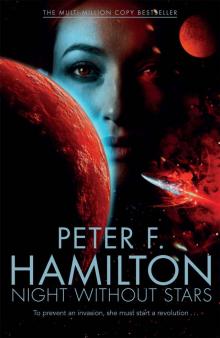 A Night Without Stars
A Night Without Stars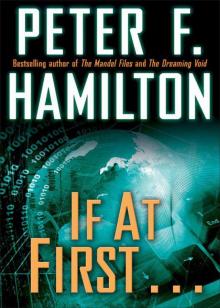 If at First . . .
If at First . . .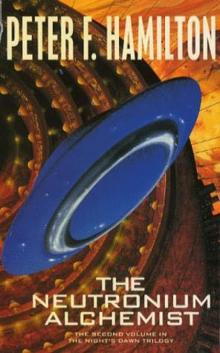 The Neutronium Alchemist
The Neutronium Alchemist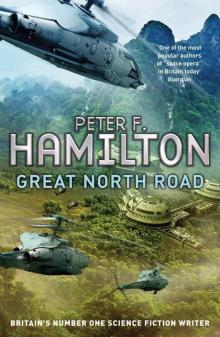 Great North Road
Great North Road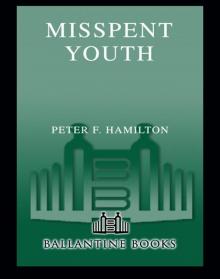 Misspent Youth
Misspent Youth Pandora's Star
Pandora's Star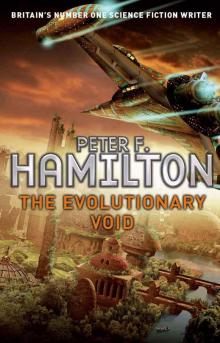 The Evolutionary Void
The Evolutionary Void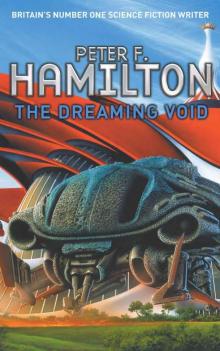 The Dreaming Void
The Dreaming Void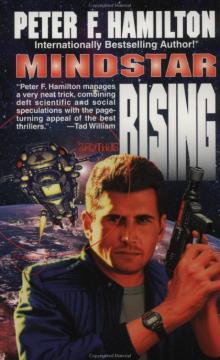 Mindstar Rising
Mindstar Rising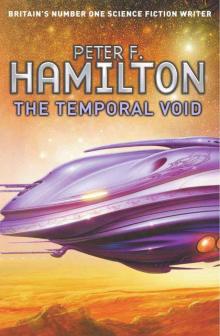 The Temporal Void
The Temporal Void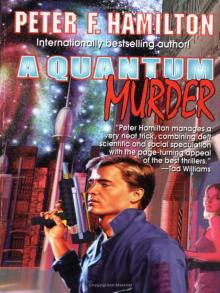 A Quantum Murder
A Quantum Murder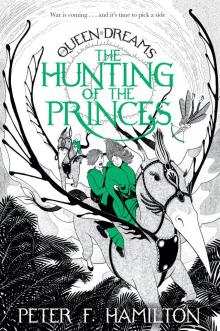 The Hunting of the Princes
The Hunting of the Princes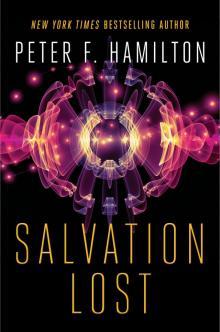 Salvation Lost
Salvation Lost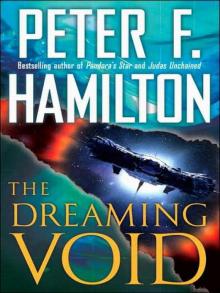 The Dreaming
The Dreaming Salvation
Salvation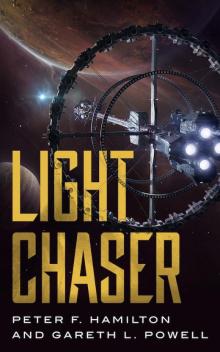 Light Chaser
Light Chaser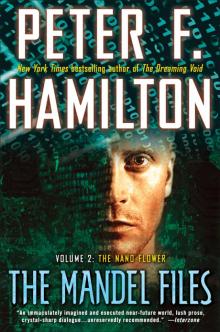 The Mandel Files, Volume 2: The Nano Flower
The Mandel Files, Volume 2: The Nano Flower![The Saints of Salvation [British Ed.] Read online](http://i1.bookreadfree.com/22/the_saints_of_salvation_british_ed__preview.jpg) The Saints of Salvation [British Ed.]
The Saints of Salvation [British Ed.]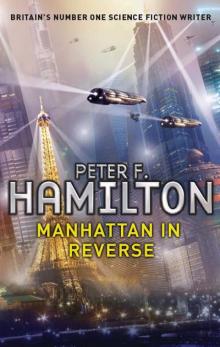 Manhattan in Reverse
Manhattan in Reverse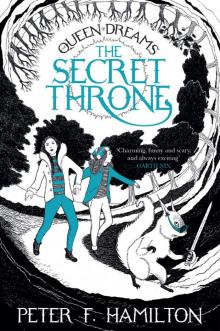 The Secret Throne
The Secret Throne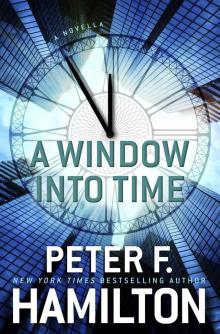 A Window Into Time
A Window Into Time A Second Chance at Eden
A Second Chance at Eden The Nano Flower
The Nano Flower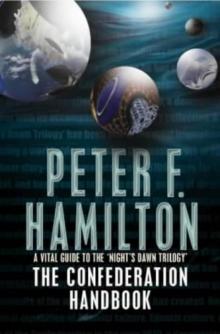 The Confederation Handbook
The Confederation Handbook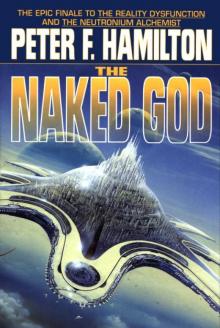 The Naked God
The Naked God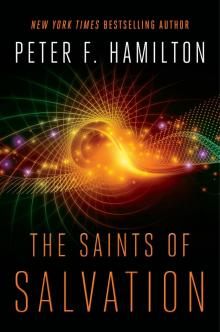 The Saints of Salvation
The Saints of Salvation The Void Trilogy 3-Book Bundle
The Void Trilogy 3-Book Bundle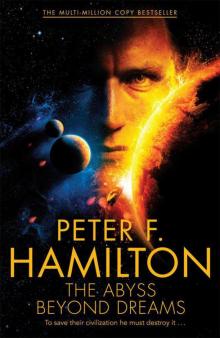 The Abyss Beyond Dreams
The Abyss Beyond Dreams A Voyage Through Air
A Voyage Through Air Judas Unchained
Judas Unchained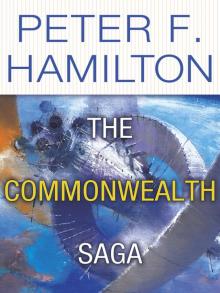 The Commonwealth Saga 2-Book Bundle
The Commonwealth Saga 2-Book Bundle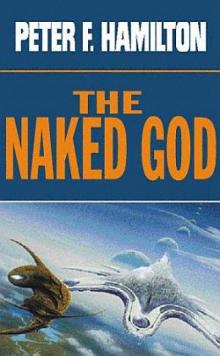 The Naked God - Flight nd-5
The Naked God - Flight nd-5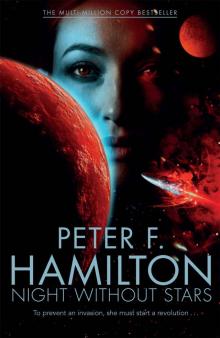 Night Without Stars (Chronicle of the Fallers Book 2)
Night Without Stars (Chronicle of the Fallers Book 2)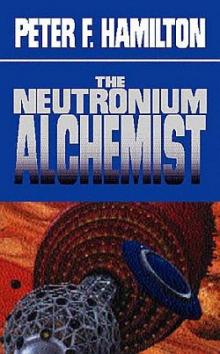 Neutronium Alchemist - Conflict nd-4
Neutronium Alchemist - Conflict nd-4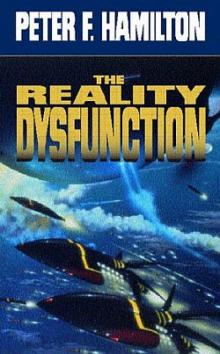 Reality Dysfunction - Expansion nd-2
Reality Dysfunction - Expansion nd-2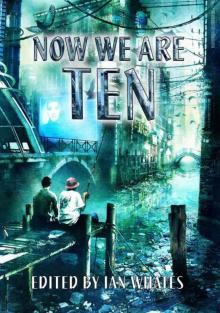 Now We Are Ten: Celebrating the First Ten Years of NewCon Press
Now We Are Ten: Celebrating the First Ten Years of NewCon Press Neutronium Alchemist - Consolidation nd-3
Neutronium Alchemist - Consolidation nd-3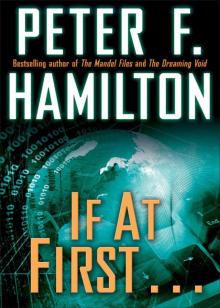 If at First . . . (Short Story)
If at First . . . (Short Story)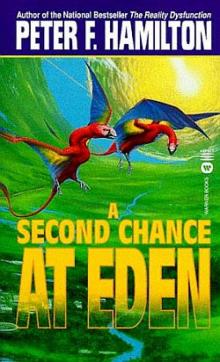 A Second Chance at Eden nd-7
A Second Chance at Eden nd-7 Judas Unchained cs-2
Judas Unchained cs-2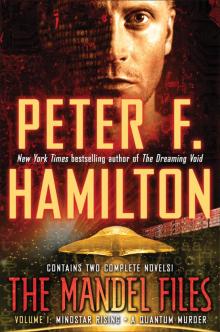 The Mandel Files, Volume 1
The Mandel Files, Volume 1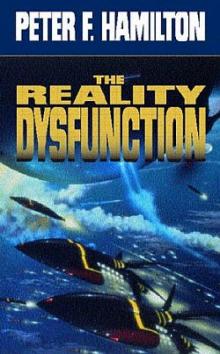 Reality Dysfunction — Emergence nd-1
Reality Dysfunction — Emergence nd-1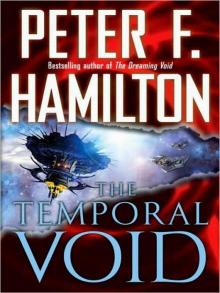 The Temporal Void (ARC)
The Temporal Void (ARC)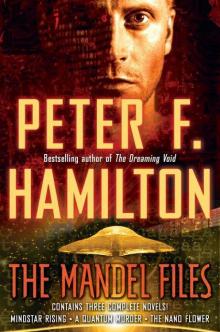 The Mandel Files
The Mandel Files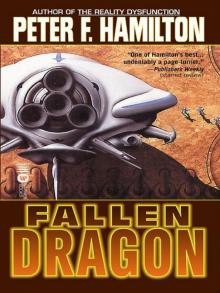 Fallen Fragon
Fallen Fragon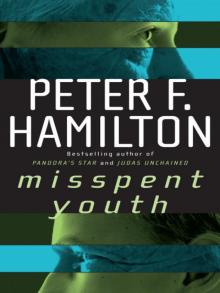 Misspent Youth (commonwealth saga)
Misspent Youth (commonwealth saga)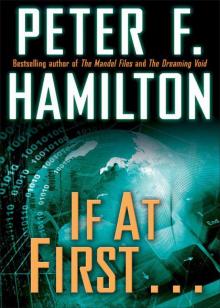 If at First...
If at First...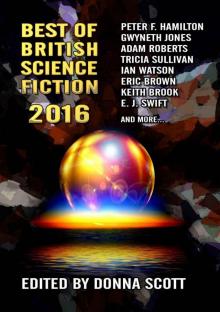 Best of British Science Fiction 2016
Best of British Science Fiction 2016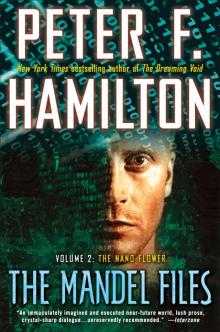 The Mandel Files, Volume 2
The Mandel Files, Volume 2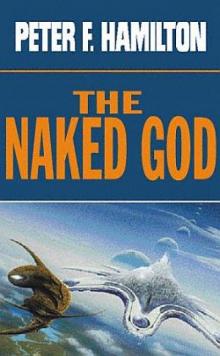 The Naked God - Faith nd-6
The Naked God - Faith nd-6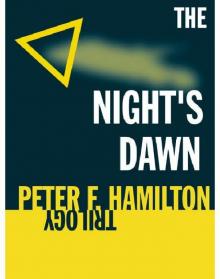 The Night's Dawn Trilogy
The Night's Dawn Trilogy Pandora's Star cs-2
Pandora's Star cs-2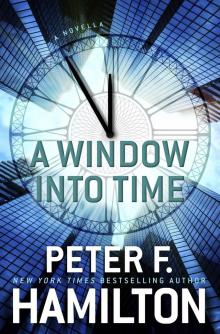 A Window into Time (Novella)
A Window into Time (Novella)